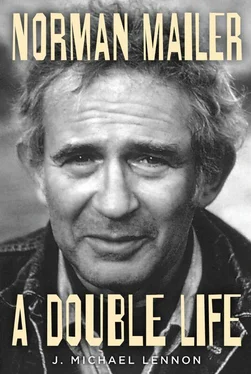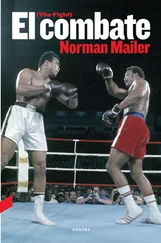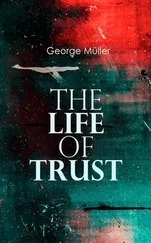On his application to Harvard Mailer noted that as a boy, encouraged by Fan and his aunts and cousins, he “used to write stories at the ‘drop-of-a-hat,’ ” but he also engaged in the usual activities of stickball, marbles, and roller skating. In the late fall of 1932, the family moved a couple of miles north to the mainly Jewish neighborhood of Crown Heights, where Norman finished fifth grade at P.S. 161. They lived in a four-story, ornamental brick apartment building at the corner of Albany and Crown Streets. Mailer described the neighborhood as “a quiet section of two-family houses and trees, a mile from Ebbets Field and Prospect Park.” He recalled that “in those days there was so little traffic we used to play touch football and roller hockey in the streets.” The houses had “small lawns in front, so small that when you were playing roller hockey, if you bodychecked somebody hard they’d go flying across the sidewalk, and you had to go scrambling up a lawn that was banked. If that ever happened to you you’d come out with fire in your eyes and your skates full of dirt.”
Roller hockey was as physical as the somewhat delicate young Mailer ever got. Late in life, he told Christopher Hitchens that Jews “had to make certain basic distinctions very early in life. Would you fight if someone called you a dirty Jew, or wouldn’t you?” In the interview’s context, his question is rhetorical and unanswered, but other statements make it clear that the young Mailer shied away from violence. “I was a physical coward as a child,” he said in 1959, a statement supported by the recollections of childhood chums who said Mailer never got into fistfights and stayed close to home. One of them, Arnold Epstein, said, “He seemed to be on a shorter leash, more obedient, kind of quiet.” Epstein added that Mailer’s family “was very proper.” More testimony comes from Aaron Goldman, a summer chum of Mailer’s older cousin Cy Rembar, Beck’s son. He remembers Mailer during the summers of the early 1930s as a tearful, bookish momma’s boy who watched Cy play baseball and tennis in the recreation area behind the Scarboro Hotel. While the Crown Heights neighborhood was not particularly rough, it was not without hazard, as Mailer explained in 1980. “I grew up in a world where really I was cultivated. I was cultivated in the sense that my mother and father treated my sister and myself as very important people. We were the center of their universe and so it was the outside world that was difficult. You know, go out in the street and you know if you didn’t have friends you get beaten up. It was as simple as that. And so I was always terribly alert to the outside world. I took the inside world for granted. And I was free to indulge myself too, to change from one personality to another.” Barbara confirms the affirmation she and her brother felt: “Not only did we know that we were expected to be better and smarter than everyone else, we pretty much thought we were.” Fan was insistent on her children’s exceptionalism, but the unintended consequence was that Mailer had, as he later explained, “an ego that was lopsided.”
The Crown Street apartment was a bastion where Mailer was spoiled and protected. Fan kept out most of the neighborhood boys, but another kind of trouble came home regularly with Barney. On rare occasions he would win at cards or on horse races. But more often, he would run up a debt with the bookies and try to win it back. When this failed, he would write a string of bad checks or embezzle from his employer (General Motors, for example) in an effort to recoup his losses. The crises accelerated when Barney lost his job and the debts—$5,000 to $10,000, vast sums during the Depression — soared. The bookies would begin calling on the telephone and Fan would become frantic. Invariably, the Kesslers would be summoned. “I’ve got criminal blood in me,” Mailer said later, adding that his father “would have gone to jail if it hadn’t been for my uncle, who would always bail him out and my father knew it.” He first became aware of Barney’s gambling because of his parents’ “terrible fights.” A day or so after a bad one, “Dave would come over with Anne and Anne would be crying. Everybody was stiff and tense all through the meal. Barbara and myself would be packed off to bed after dinner. I’d lie awake for hours listening to them argue.” Barney was cool in these clinches, Mailer said, and it was a bit of a comedy, but “a comedy on the edge of a cliff. Dave would get apoplectic. Dave died of asthma, finally, and I think my father was one of the people who gave it to him because Dave would blow gaskets in his brain to keep from strangling my father.” When Dave would verbally assault his brother-in-law, Barney would reply in his clipped British accent, “ ‘I don’t know Dave how you can speak to me in that fashion.’ At which point Dave’s asthma would deepen.”
After one particularly bad confrontation just before Norman’s bar mitzvah in February 1936, a distraught Fan contemplated leaving Barney and confided in her son. He said, “How can you do that to us, when we’re kids?” Fan then gave him a blunt report of the extent of Barney’s gambling. “I knew my father was an irresponsible gambler,” Mailer said. “I always heard it from her side, never from his.” But Fan never spoke again of a divorce because, Mailer said, it “went against every tradition in her. In those days, you got married and took what you got and didn’t complain. To her, a divorced woman was a whore.”
She had a great anger at my father — it was almost implacable — for not being a provider. But at the same time, she loved him in her way. After that one attempt, she gave it up. If the children didn’t want it, then she was not about to do it against our will. Years later, I used to think, “Gee, maybe I did her a terrible injustice and cut off her life and her possibilities.” On the other hand, when I think of a stepfather and how it would have torn her. I didn’t brood about it… except for those awful nights which went on until I went away to college; those dreadful nights when my uncle came to the door and I could see by his face: “Uh-oh, one of those nights.”
At some point, he told his sister that Barney was a gambler. She “resented it more. And so she was cool toward him; she stayed cool and angry toward him. Which broke his heart. He adored her.” Barbara was “closer to my mother,” he said. “It was that feminist business: my mother was working so hard and this man’s not responsible.” From the mid-1930s on, Fan ran a small oil service and delivery firm, the Sunlight Oil Corporation, which Dave Kessler had set up, partly to provide oil to his candy company and partly to help out the Mailers. Initially, Barney worked there, but after he began tipping the till, he was out and Fan took over entirely, working with one driver. “She really lived and breathed for that business,” Mailer said, taking late night calls from customers with broken furnaces and empty tanks while earning a quarter of a cent per gallon profit.
Barbara explained that her mother’s hard work and financial anxiety, combined with her loathing of Barney’s addiction to games of chance, “leached the complexities out of her and made her monolithic.” No surprise that she referred to herself, as did her children, as the Rock of Gibraltar, “deep and large, and all there to see. The metaphor for Dad, on the other hand, could be a tidal pool — charming on the surface, and teeming with a secret life in the shallows beneath.” Barney gambled when he could and worked when he could, but usually lost his bets and was rarely employed. “One of my recollections in the depth of the Depression,” Mailer recalled, “is my father coming home after looking for work all day and Barbara and myself running to the door and saying, ‘Did you get a job today, Dad?’ And he sadly shaking his head no…. How sad we all were about that. ‘Brother, Can You Spare a Dime’ is one of my favorite songs.”
Читать дальше












